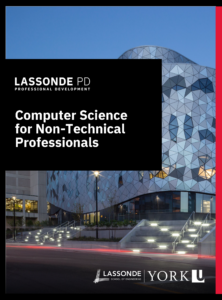Program Length
12 weeks
Program Dates
TBD
Program Format
Self-paced, weekly coaching sessions
Tuition Fees
$490 plus HST
Prerequisites
None
Course Overview
This course helps you understand the role that computational thinking can play in solving problems. Regardless of your professional background, the course helps you to feel confident in your ability to write small programs that enable you to accomplish useful goals.
Topics include pseudocode, variables, conditionals, iteration, arrays, objects, functions, sorting, searching and simulation.
Designed by  for a Professional Audience
for a Professional Audience
This unique course was curated by Shopify (Gail Carmichael) and was offered to Shopify’s non-technical employees.
This course contains materials contributed or inspired by Dr Mark Lanthier, Dr David Mould, and Dr Jason Hinek.
Who Should Attend?
This course has been designed for individuals with little or no programming experience. The course is tailored for early to mid-career professionals.
What You Will Learn
The training course allows you to:
- Better understand that computer science has many applications, including those that you are passionate about.
- Embrace experimentation when figuring out how a concept works in code.
- Learn the problem-solving process of breaking a problem down, making a plan and implementing the plan.
- Appreciate that expressing ideas in English is as important as expressing them in code.
- View multiple attempts at getting something right as positive iteration rather than failure.
- Embrace a growth mindset and believe that everyone can succeed if they are willing to put in the effort individually required.
- Gain the confidence to solve problems independently through effective use of resources available (including documentation).
• Introduction: computer science and computational thinking
• Drawing Pictures with Processing: data and variables
• Interactive Painting: functions, switch statement
• Jukebox: Booleans, conditionals
• Sheep AI: while loops, arrays
• Foreign Student Visualization: parallel arrays, strings, algorithms, objects, recursion
• Set Cover Problem: for loops, object references, object copying, shared data
• Image Processing (bonus topic)
Here is the list of badges:
• Overall badge: “Introduction to Computer Science: Art, Games and Simulations.”
• Sub-badges, (which would correspond to completing each chapter):
• Computational Thinking and Variables
• Functions and Conditionals
• Iteration, Arrays and State Machine Simulations
• Data Visualizations with Objects
• Getting Smarter with Algorithms
Faculty
Program Lead

Gail is an experienced programmer and educator with 15 years of experience in technology and computing education. In her line of work, she has seen people from all kinds of backgrounds develop their careers in computer science and find their true passion.
